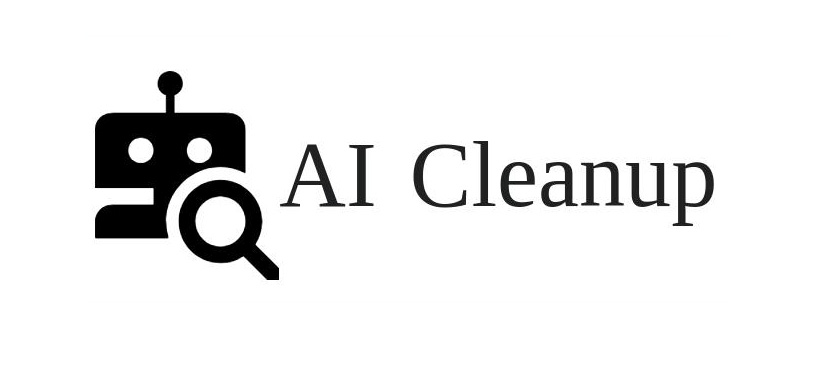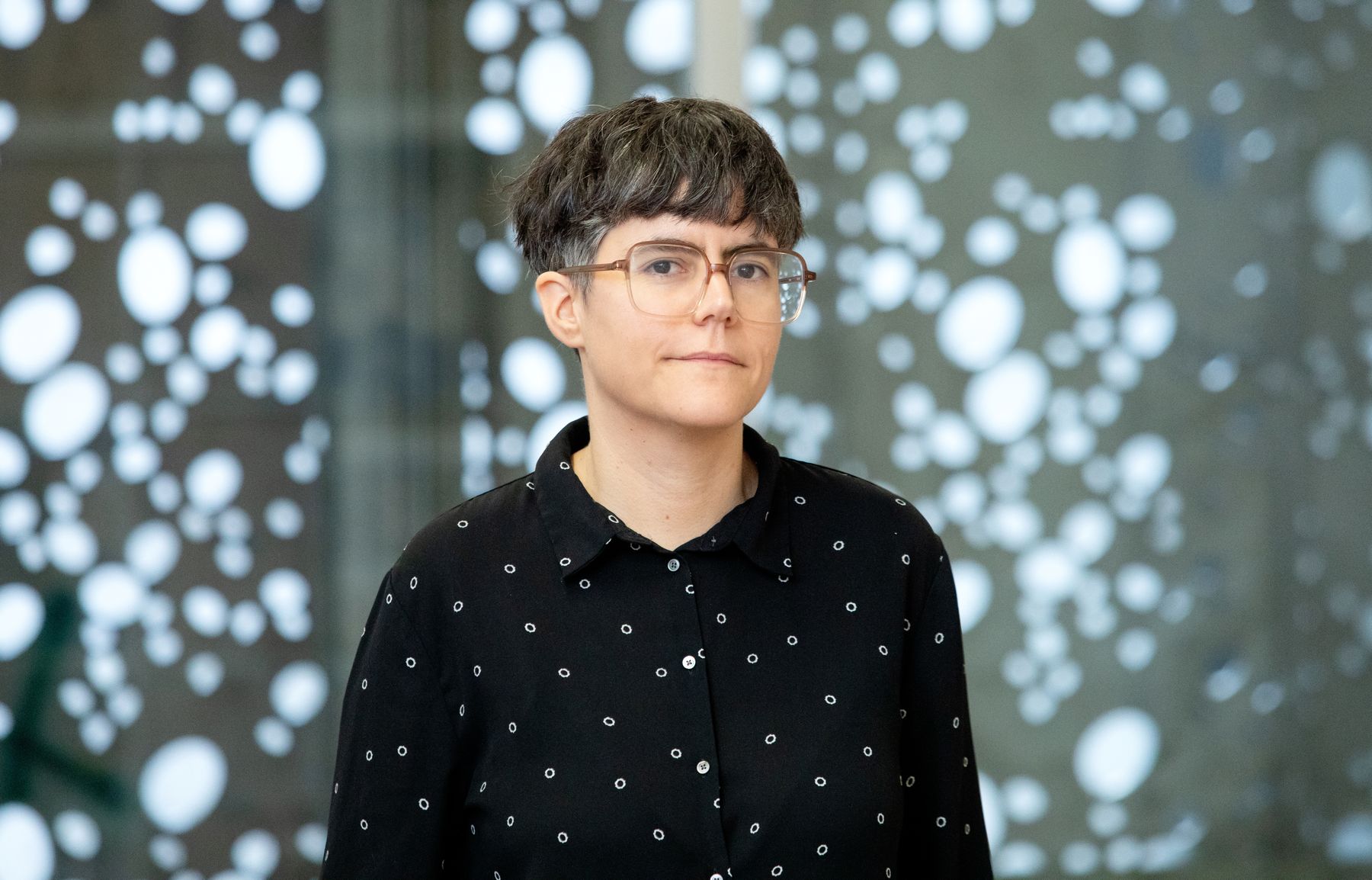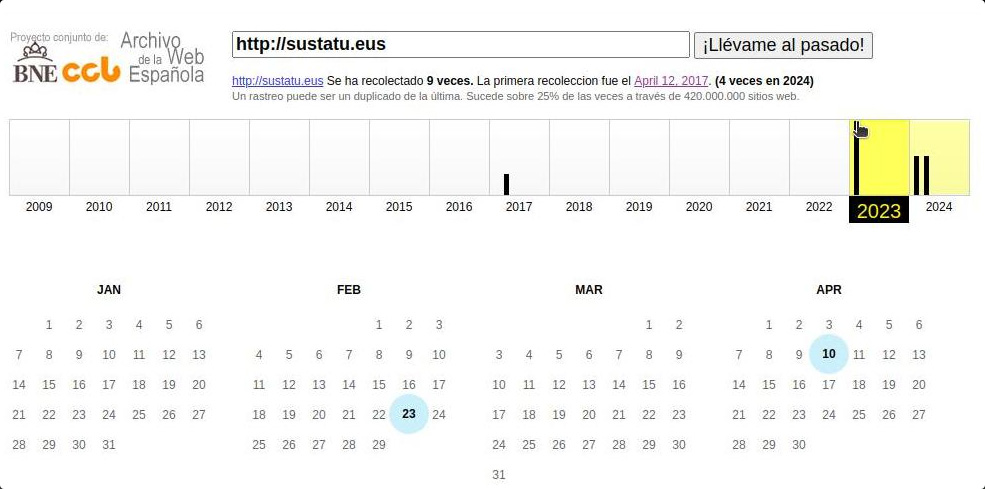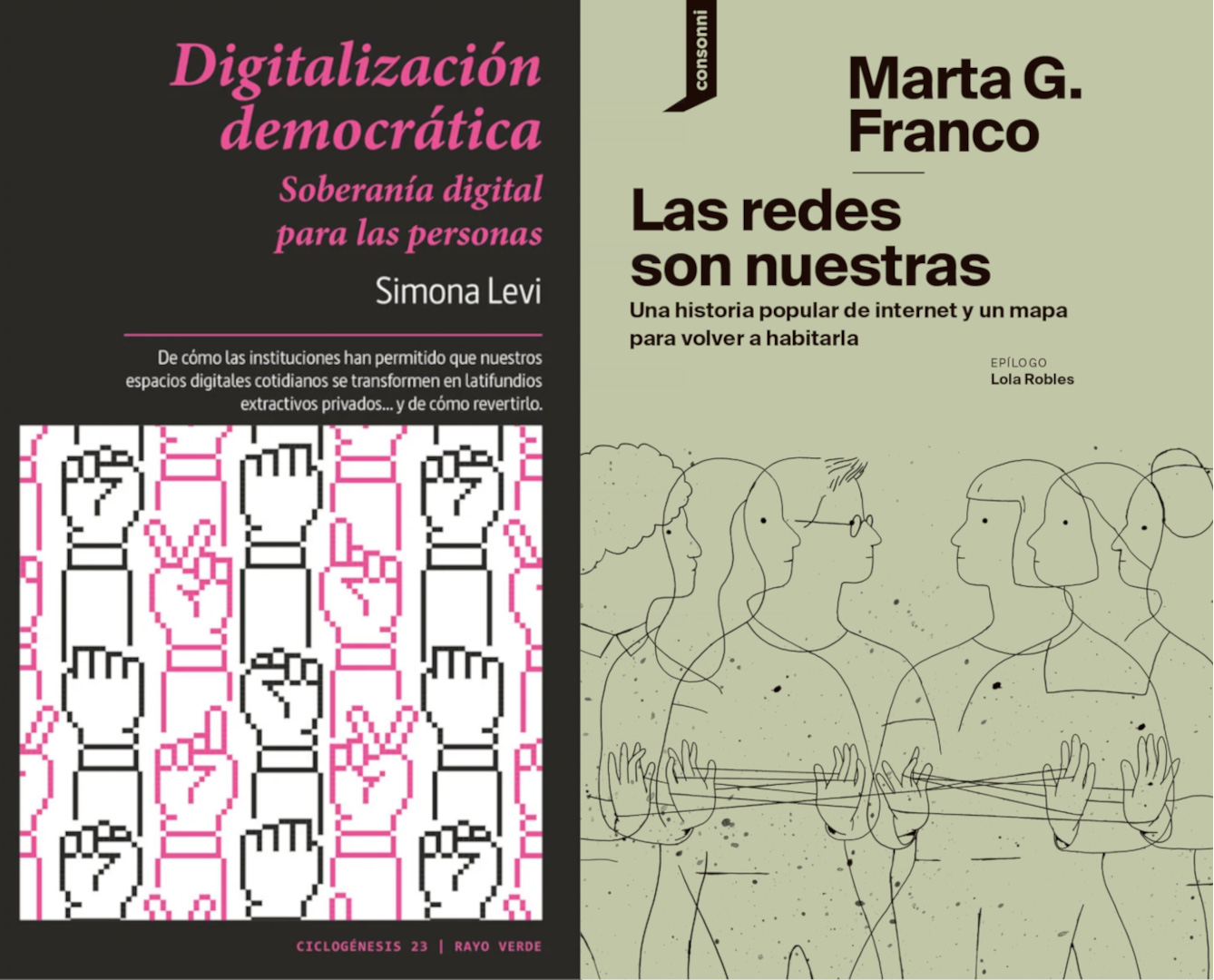"Thanks to the Internet window we see the world, but we don't see the lens itself."
- This interviewer has been interested in the work of Remedios Zafra for a long time, and since he started doing interviews he has always had his name in the head and on the list. The Andalusian thinker analyzes with rigor, in books and conferences, the internet, digital tools and their consequences. He was in Pamplona in mid-October at the Letrawounds festival, and this time the interviewer did not miss the opportunity.

Zafra Remedies. Zuheros, Córdoba, Spain, 1970
Writer and essayist. He has studied anthropology, philosophy and art and has been a professor at the University of Seville for a long time. He is currently a researcher at the General Scientific Research Council (CSIC). He has published several books, the last this year: The invisible loop [Invisible Bule] (Nobel Editors). When she writes the programs, the literary tool does not leave them far and her novels give much to think. Also read Eyes and Capital [consonni, 2015] and Those Who Watch [Lookouts] (Forcola, 2016). He has received many awards.
Contemporary culture, digital culture, the transformation of creative work and identity policies on the net are some of the issues you have addressed in your books. We could say that it focuses on the present.
I'm interested in history, but as a feminist, I know enough not to have nostalgia for the past. In this sense, I am very interested in the present and the difficulty of the time we live. They present us with a wide variety of decorative options, but they hide some questions and inertia.
It focuses on the Internet and digitisation.
I am interested in the structure of the Internet. I call it stratum. It's an invisible stratum, an increasingly invisible stratum formed by programming algorithms, that structures and conditions the world of our everyday relationships, but we don't see it. Thanks to this lens, we see the world, but we can't see the lens itself.
At first it wasn't.
When we started thinking and using the internet in the '90s, we could see the code, manipulate it. It would open and close like a shutter and we had a way to understand what was behind it. But the structures that have been offered to us since the 2000s have been different. We can do things separately and the code is presented as an opaque, hermetic value, a treasure trove of big business. It looks like a public land, so many people live, but it is private and companies have rights to protect their capital.
In his last attempt he speaks of an invisible vulture.
As I said before, the idea of inertia was very present. Inertia has a symbolic power, and in this sense the invisible loops are symbolic loops: we learn in our cultural context and with them we repeat and perpetuate a certain identity, maintain a concrete way of doing without effort. In the case of programming, I wanted to analyze how those identities are repeated, especially when we talk about conservative identities, which say that the children of the poor will be poor, and that the rich children will be rich, and that the identities that read data and algorithms will continue to project the same identities in the future. It looks like a descriptive game, because it's statistical based programming, but in the end it becomes a game of progress.
"Don't create algorithms to impress anyone, but reproduce existing models in the world."
And it also happens at large escala.La
algorithm programming acts on a global scale, does not affect a small group of people. You read data on a global scale, you make forecasts and you create constraints, inertia and invisible loops. All this, besides repeating certain differences between people, responds to the interests of capital. When we think about these things, we get to that point: the hegemony of economic power, which orders everything else.
.jpg)
It considers it dangerous that algorithms are neutral.
Thanks to feminism, we have learned what happens when we believe that objectivity and neutrality are the same, and we have learned that to understand our discourses we have to situate and contextualize them, moving them away from absolute truths. Well, that understanding that normally assumes complexity is the one that is eliminated from the negotiations and the exchange of algorithms, because the goal is for the machine to follow, produce and run, because it is a hyperproductive, competitive and accelerated machine that seeks to generate more and more profits. And if collateral damage occurs along the way, for example, if the algorithm excludes people and this poses problems to these people, or if there are directly people who don't come into the game of technology, because it doesn't matter, because the mercantilist priority prevails over the pedagogical, social or political value.
And we must not forget that, although algorithms are not human, they are created by beings humanos.Cuando we talk about
algorithms, that is, mathematics and above all mathematical models, as science are impactful and necessary, and artificial intelligence is and will be absolutely necessary, so when we talk about this kind of critical discourse, it is not about rejecting mathematical models or artificial intelligence. But precisely because of the enormous value that those instruments have and that they will have to help people, you can't take an ethical look, you can't think they're neutral because they're not neutral, and to start with, they're not neutral because the programmers are not neutral.
In other words, when we talk about trends in programming or artificial intelligence, we have to necessarily talk about the trends of the human beings who produce it. Many companies have shown their willingness to identify and correct these trends, but we do not know if they have, because everything is very tight and opaque – along with the problem of scale, that is another problem. The truth is that the algorithms and the people who create the code are very similar: white men, those in a certain place in the world, young people. I don't think you're talking about bad intentions, you don't create algorithms to impress anyone, but you reproduce models that exist in the world.
One of the possible risks is homogenisation.
When we talk about trends in mathematical models, Cathy O’Neil talks about the risk of loss of diversity, but I didn’t understand to what extent it could be harmful. One day I remembered my father. It is a peasant who once exerted great pressure to remove the older olive trees, from many feet, and place young olive trees on one foot, in order to introduce the machine, reduce the number of workers and accelerate production. This homogenisation has allowed technology to be introduced in different sectors, but I believe that homogenisation also occurs in socialisation.
You've been paying attention to the evolution of the Internet for a long time, what would you highlight from the last 30-35 years?At first, in the 1990s, the Internet
was not just writing code, but was working in other places and there were many discussion forums in the technological, academic and even artistic fields. I find it interesting, because art in general more readily admits contradictions, be and not be at the same time. And in those forums, there was a social, critical, theoretical pressure to build a better world, and that was what drew me: the internet was a milestone in the history of humanity, and for those of us who were in some claims that could bring very positive things.
"The Internet was given over to private management, excluding public authorities, and it opened the way to the online context we know today"
After the 2000s,
the Internet began to socialize at a dizzying rate, and at that time a series of emblematic meetings were organized to determine how to territorialize, govern and manage the Internet in some organizations worldwide. I believe that in those debates humanity lost a great opportunity, and I would say that we have to conquer those opportunities again: the internet was given over to private management, outside the public authorities, and the way opened up to the online context we know today, that normalized place that we live in disguised as public space, but that follows the norms, principles and ethics of the company in question. The gurus of these companies, besides having control over what we do, also control what we can do, and they also seem to have in their hands dynamics that influence the democracies themselves. There is a very important issue at stake.
.jpg)
Before I finish, I would like to ask you about the book you published a few years ago: Enthusiasm. Precariousness and creative work in digital form. Precariousness and creativity in the digital age] (Anagram, 2017). In my environment, there are a lot of cultural creators who, reading that book, really shocked them, as if I called one of their concerns. You have also written a lot of people because you felt very identified. How did that welcome happen?
I believe that to some extent what I propose in some books or conferences was reaffirmed. In contemporary culture, in digital culture, the value of quantity prevails, based on mathematics, statistics, sociology and certain sciences, as these disciplines work with large numbers. It seems that to talk about the time we have to talk about big numbers and statistics. I, however, have always had another perspective, perhaps because I studied anthropology and I am interested in literature and philosophy. Statistics and sociology are, of course, fundamental, but this hierarchy being developed in the world and in academia is making little appreciation for the scientific and critical view of the ethnographic and anthropological view. Enthusiasm and later Frail [Frail] show how we can get from the biographical to the cultural aspect. They usually do surveys and interviews to analyze the cultural and classify us, while if people can freely express their concerns in a story, or even in the colloquial intimacy, there's an opportunity to understand and create empathy, and people say it to me, too.
"The truth is that the algorithms and the people who create code are very similar: white men, those in a certain place in the world, young people."
Was that the origin of Enthusiasm? What about you and yours?
My peers, my students, saw that all of us had a double life. We were all in the world of creativity, and from the outside they told us all the time that we were privileged because we worked on what we wanted. To us, however, did not look like this, we did not have time to materialize the books or projects of our dreams. The staff dedicated to the creation or researchers of the academy, especially in recent times, chain temporary jobs one after the other in order to live. Before I wrote the book, I thought maybe it was going to be the sensation of a few, but after the book was published, a lot of people emerged from that ostracism, as has also happened with feminism.
And at that time it seemed to me that it could be a starting point for creating a political collectivity, a union collective or a transformative political collectivity; it seems to me that we could perhaps take advantage of this concern of conscience. In short, we who are on these issues have a great motivation for culture, creativity or writing, and when we act well we know that we can offer valuable things to society. But we are limited, neutralized, sometimes by bureaucracy and sometimes by deformation. I believe that in this blockade there is a political switch, it has to be.
He has vision and hearing problems. How do they affect you?
I have been very lucky and, despite having very little vision, I have had the opportunity to learn and work without reducing my life. I see very little from the right eye and have very little central vision in the left eye. I have had good hearing, but in the last four years I have lost approximately 50% of hearing, which has forced me to change my work as well. In college, though they saw me little, I could teach smoothly, but with hearing aids, even though they were able to speak and understand, sometimes I didn't understand a few words when they were talking to me. So, I had to rethink my life.
In any case, I think it has helped me to reflect more. The visual and auditory lens are sticks that I use in my day to day, and so I project my questions to the world. When I think about algorithms, I think about hearing aids. In the world I hear without hearing aid, there are no birds, and my steps don't have sound, how many lenses of this kind are there in the world that turn off some things and turn on others?
PuntuEus-ek doako tresna erabilgarri bat jarri du edonoren eskura, webguneen segurtasuna erraz ebaluatzeko. Webtest.eus izeneko autoebaluazio-tresna honi esker, erabiltzaileek beren webgunearen segurtasun-maila modu sinple eta argian azter dezakete.
Zer jakin behar dut? Norekin erlazionatu behar dut? Non bizi behar dut? Ardura horiekin gabiltza gizakiok gure gizarteen baitan bizitza on baten ideia bizitzeko bidean. Ondo erantzuten ez badakigu, bazterretan geratuko garen beldurrez.
Joan den astean, kanpoan geratzearen... [+]
We know that artificial intelligence is representing many fields in human beings: comfort, speed, efficiency ... We've been led to believe that human endeavor is an obstacle to the speed needs of this capitalist world. The aggressions to reduce our chances of doing, doing and... [+]
On November 15, we will celebrate in Errenteria-Orereta the three days organized by the different agents that make up Euskal Herria Digitala. This is a feminist digital self-defense workshop and a talk about democratic digitalisation.
The members of Movie Tech will offer the... [+]























